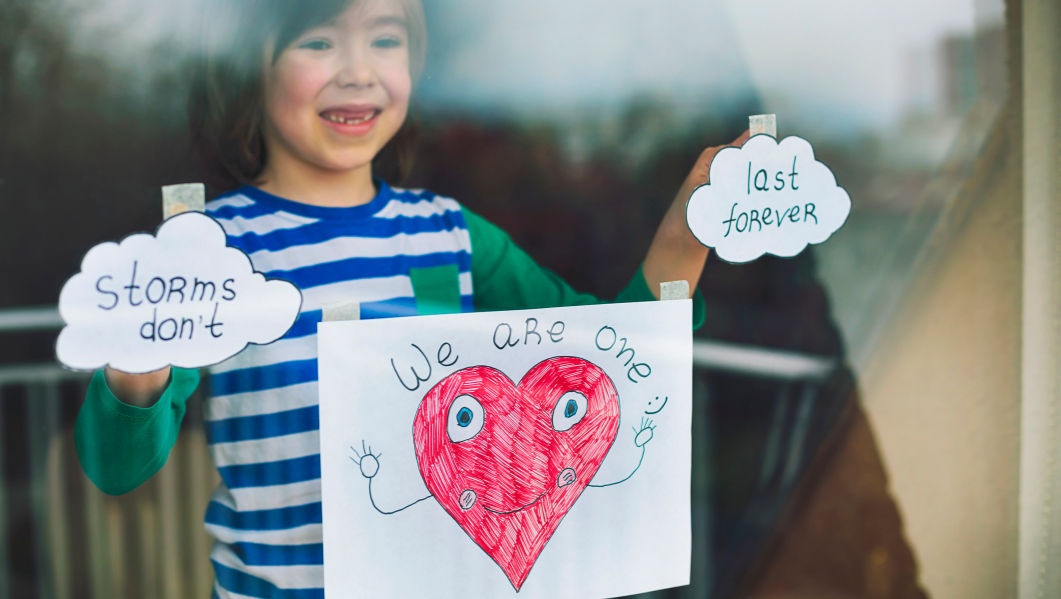What Does it Mean to Love Your Neighbor Today?

Love your neighbor. How many times a day, and in how many ways, do we communicate this command to our kids?
Can you say that in a kind voice?
We share with our friends.
Look her in the eye when you talk.
Important lessons, no doubt.
But it’s not every day (or, ahem, every lifetime) that we find ourselves in the midst of a worldwide pandemic and moments of racial reckoning. You might consider this the perfect opportunity to teach your children, by words and example, what it truly means to love your neighbor.
What does the Bible say?
In Mark 12:30-31, Jesus explains, “The most important commandment is this . . . You must love the Lord your God with all your heart, all your soul, all your mind, and all your strength. The second commandment is equally important: ‘Love your neighbor as yourself.’” (NLT)
We know this stuff, right? And you might think we’re mentioning it here as an easy way for you to read the verse to your kids. So go for it. Read away.
But when you do, pay close attention to the word equally. We are called to love God. And we are called to love others. And both of these commandments hold equal weight. So the question we have to ask ourselves is: what should that love look like?
Thankfully, we have a guide.
We can draw on the love we have for God—following the first commandment—to guide us in how we show love to others.
God sent His only son, Jesus, who gave His very life on the cross for each of us. He showed great love through sacrifice. And He did it all with a willing attitude and a humble heart.
If we love Him, we’ll aim to be like him. And if we are to be like Him, we’ll love others the way He loves us.
So what does this command look like in today’s climate?
A morning scroll through the news or your favorite social media app reveals the pains of 2020. And they’re not just regular woes.
Healthcare workers report feelings of emotional overwhelm and burnout.
Small business owners are shuttering doors and scrambling to pay bills.
Black and white Americans wrestle with the present realities of racial injustice.
A pair of hurricanes threatens to devastate multiple states in its path.
And in the crosshairs, you’re likely to find people in your own community who’ve lost loved ones or livelihoods. Families who no longer see eye-to-eye. Friends who are longing for a sense of peace.
People who need the love of a neighbor.
As parents, we can model what it means to LOVE YOUR NEIGHBOR in 2020.
The unique challenges of this year offer us easy ways to love others. And you can bet our kids are watching to see how we respond.
So if you are physically able, wear the mask. Give space to the people around you.
If your finances are strong and steady, look for ways to support those who are struggling.
Request a few books from your local library to better understand the lives and history of our brothers and sisters with beautifully different colors of skin or cultures.
Speak out for people who need a voice.
Reach out to people who need a hand.
And when you come across a conversation that’s controversial or heated, pause before you weigh in. Consider your purpose. Are you motivated by love?
Empower your kids by engaging them in age-appropriate ways as you LOVE YOUR NEIGHBOR.
Of course, when it comes to life lessons that last, nothing beats inviting your kids to participate. Children need to know that they are—right now—agents for change. Not when they’re older. Not when they understand more. But right now, this very day.
So when you wear a mask, social distance, learn about another culture, speak out or hold your tongue, take a moment to explain what you’re doing—and why—in age-appropriate language.
Yes, this might mean you’ll need to have a few uncomfortable conversations to give context to what’s going on around you. Your child might learn that people are hurting in myriad ways that make her sad. But that’s okay.
The reality of our present world—and let’s be honest, our past and future world too—is that life can be so, so hard. But our God is so very good. And people can choose to love others how He loves us—in a way that’s transformational.
For kids who are going back to school with a mask mandate, you can frame the nuisance as an act of love, saying, “You’re wearing that mask to protect yourself and others. It’s a kind thing to do.” The same goes for blowing kisses to grandma instead of giving hugs or dropping off goodies on a doorstep in place of gathering for a big barbeque.
You might also encourage your child to brainstorm ideas for how she can brighten the day of a person who’s feeling down. Kids love to get creative, be silly, and use their strengths for good—so let them!
And now is the perfect time to instill in your child the inherent value in all people—those who are like us in every way and those who couldn’t be more different. Talk openly about how our differences make the world a more enjoyable and interesting place. Ask your kid for examples. You might be surprised to learn about the beauty they already see in others.
Kids are pretty awesome in that way. Just as we’re teaching them—they’re teaching us.
. . . . . . . . . .

Stephanie Thomas writes about parenting, health, personal development, and money management. She loves to read—novels, memoirs, pictures books, cookbooks—and to explore the great outdoors. Sometimes she even brings those cookbooks into the kitchen. Stephanie lives in Nashville, Tennessee with her husband, Eric, and their rambunctious boys, Henry and Leo.